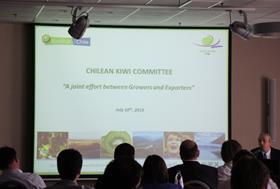
The Chilean Kiwifruit Committee (CKC) has hosted its first technical seminar and workshop to demonstrate the progress made with its maturity and ripening protocols to the European market.
According to the CKC, more than 40 European importers and distributors – representing 24 companies and nine countries – gathered in Rotterdam this month to share the latest information about technical activities undertaken by the CKC over the last three years, to ensure that Chilean kiwifruit can compete on European retail shelves.
Carlos Cruzat, president of the CKC, and Dr Juan Pablo Zoffoli, professor of physiology and postharvest technology at Universidad Catolica de Chile, outlined the work that the CKC has been doing with its grower and exporter members in Chile to design protocols optimising the performance of Chilean kiwifruit as it travels through the supply chain, and ensuring that it arrives with the end consumer offering the desired pressure, eating quality, flavour and appearance.
In th seminar, they explained the details of new technologies that have been developed to ripen kiwifruit in such a way that it will reach its marketplace 'showing superior attributes to competing fruit from other countries'.
Trade colleagues were also shown the data behind blind tasting sessions that have been carried out with European consumers, in which kiwifruit grown and exported using the new Chilean ripening and maturity protocols outscored kiwifruit from Chile and various other competing sources.
The seminar also included a presentation from Christophe Desplas, director of ProChile Netherlands and the session ended with an interactive workshop that included practical demonstrations which exploded some of the myths surrounding general trade perceptions of kiwifruit pressures and what they actually mean in terms of ripeness, quality and performance.
“For a first event of its kind, this was a really good experience,' explained Cruzat. 'We were very happy with the turnout, especially that people flew in from all corners of Europe to attend. Our growers in Chile were instrumental in inviting their customers and that illustrates how important they believe it is to share this information with the industry.
“We have been clear from the outset with our members that before we can seriously consider expanding the international market for Chilean kiwifruit, we needed to reach a stage where we could be confident that the product we were exporting would consistently meet the standards set by our customers around the world.
Cruzat noted that the Chilean kiwifruit industry had worked hard to develop a successful protocol, and was now ready to arm colleagues with information assuring the European retail trade that Chilean product is competitive with the rest of the kiwifruit industry.
“The feedback we had from the guys who attended was brilliant,' Cruzat added. 'In any category, it is helpful to have evidence to base your purchasing decisions on and we have given them that. I think we have proved that our fruit will meet the expectations of European consumers and we will now embark on development of a marketing strategy that will support our attempts to take the commercial opportunities that exist for our kiwifruit in Europe.”



